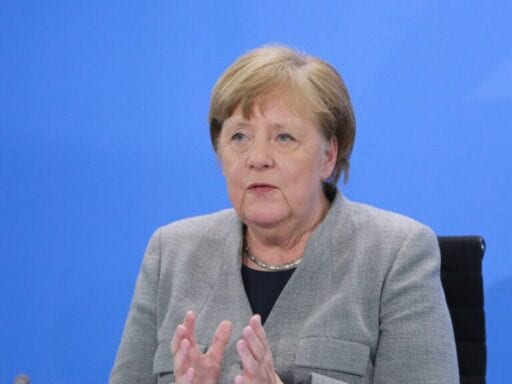Germany doesn’t have much “wiggle room” in its hospital capacity. The US has even less.
When you have a huge hole where your nation’s leadership should be, it is wise to borrow the best of other people’s leaders. They can’t make America’s big decisions, but they can fill in some of the gaps.
In the Covid-19 pandemic, we can take comfort in their competence and use their wisdom to guide us about what we each should do.
Right now, the US and many other nations are considering easing social distancing and other restrictions if and when their new coronavirus cases and hospitalizations become flat or start to fall. And German Prime Minister Angela Merkel (who happens to have scientific chops) has an important lesson that we should all listen to.
On Wednesday, she laid out important logic about the coronavirus pandemic that hasn’t been communicated clearly enough here in the US. In simple and clear terms, she explains why Germany doesn’t have much “wiggle room” in its hospital capacity. Because of this, any lifting of its lockdown, like allowing some shops to open next week, will remain “on thin ice.”
Merkel’s explanation, which went viral, is centered on the metric called R0, or basic reproduction number. It represents the number of people a sick person will infect on average in a group that’s susceptible to the disease (meaning they don’t already have immunity).
She says that if Germany’s R0 were to shift from a flat rate of 1.0 to 1.1, the nation’s hospitals will be crushed by October, without sufficient resources to care for all of the severely ill Covid-19 patients. If the R0 goes up to 1.2, that overload hits in July. And so on.
Covid’s current global average R0 is 2-2.5, but Germany has done a good enough job of managing its outbreak to get its reported estimated R0 down to 0.7 as of April 17. That’s low enough for Merkel to sanction “a tentative easing of restriction.”
America, for many reasons, has even less wiggle room than that. Germany has eight hospital beds per capita compared to America’s 2.7 beds. In ICU beds, Germany has 8.3 per capita while America has 6.6.
It is also testing for coronavirus at twice our rate (21 vs 9.8 tests per 1,000 people). Without robust testing, you can’t keep good tabs on R0 or the related Rt — and you can end up flying blind, risking health system overload and avoidable deaths.
Here’s Instagram co-founder @kevin‘s new virus site that takes his recent models and updates them live in real time, in collaboration with @mikeyk — https://t.co/zpi35TIEdw pic.twitter.com/2qHZLDaL5n
— Emily Chang (@emilychangtv) April 17, 2020
Covid-19 spreads in an exponential way, and it’s worth emphasizing exponential growth’s dynamics. Tiny shifts in risk grow very quickly, leading to deadly results as this useful tweet thread shows:
Exponentials still have the capacity to shock me.
If mass wearing of masks make just 0.01 shift in the spread per day, from say 1.22x to 1.21x, there would now be ~20% fewer cases (and ~20% fewer deaths) in the UK since March 12.
I had to double check that multiple times.
— Don Syme (@dsymetweets) April 5, 2020
The small choices we each make about risky behaviors are like playing Russian Roulette, but with a machine gun. You may have thought that if you’re not in a high-risk group (like older adults), and the case fatality rate is around 1 percent, then the threat isn’t so great. Surely we can loosen restrictions?
But that’s like being locked in a room with 100 people, where your collective behavior determines how many bullets are live in the machine gun that’s about to strafe all of you. You might not die, but others surely will.
Covid-19 is already the leading cause of death in many areas, including New York state, Louisiana, and Washington, DC. Do you want to add ammunition to its arsenal?
Support Vox’s explanatory journalism
Every day at Vox, we aim to answer your most important questions and provide you, and our audience around the world, with information that has the power to save lives. Our mission has never been more vital than it is in this moment: to empower you through understanding. Vox’s work is reaching more people than ever, but our distinctive brand of explanatory journalism takes resources — particularly during a pandemic and an economic downturn. Your financial contribution will not constitute a donation, but it will enable our staff to continue to offer free articles, videos, and podcasts at the quality and volume that this moment requires. Please consider making a contribution to Vox today.
Author: Jag Bhalla
Read More



